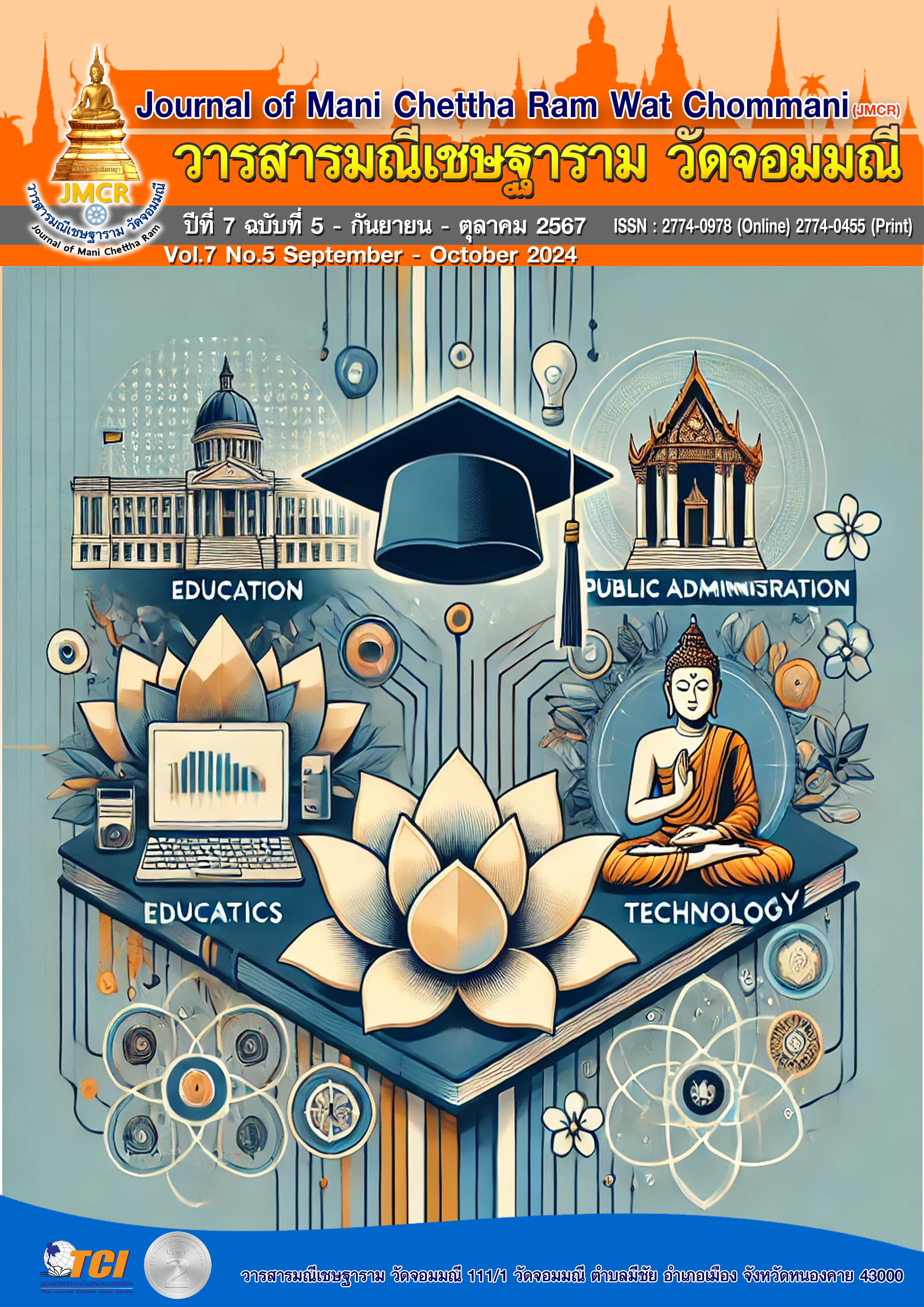THE ADMINISTRATORS OF EDUCATIONAL INSTITUTIONS USE THEIR POWER TO INFLUENCE THE WORK OF TEACHERS, WHICH IS GOVERNED BY THE OFFICE OF THE PRIMARY EDUCATIONAL SERVICE AREA, PHRA NAKHON SI AYUTTHAYA, AREA 1
Keywords:
Exercise of power, School administrators, Teacher performanceAbstract
This research aimed to 1) study the use of power by administrators
2) study the performance of teachers 3) study the relationship between the use of power by school administrators and the performance of teachers 4) study the pattern of the use of power by school administrators, the abuse of power by school administrators. The sample group that affected the performance of teachers, 332 people, was obtained by simple random sampling. The instrument used in the study was a questionnaire and the reliability of the use of power by administrators and teachers was 0.94. The statistics used for data analysis were mean and standard deviation, Pearson's correlation coefficient and normal multiple regression analysis.
The research results found that
1) The use of power by school managers was generally at the highest level. When considering each aspect, it was found that the aspect with the highest mean was the use of expertise, while the aspect with the lowest mean was the use of reward power.
2) Overall teacher efficiency, compliance with regulations is at the highest level. When considering each aspect, it was found that teacher performance had the highest average value and learning management had the lowest average value.
3) The relationship between administrators' use of power and teacher performance is overall positively related, statistically significant at the 0.01 level.
4) School administrators' behavior of using power to influence teachers' work is the use of expert power. The statistical significance level is 0.01 and the prediction rate is 7%. The regression equation can be created in the form of raw scores and standard scores as follows: Prediction equation in the form of raw scores Y = 5.199 +(-0.137. X5) Prediction equation in the form of standard scores in the form of Z ̂ = (-0.269X5)
References
กาญจนา เกสร. (2555). รูปแบบการใช้อำนาจของผู้บริหารสถานศึกษาของโรงเรียนสังกัดสำนักงานเขตพื้นที่การศึกษาประถมศึกษาปทุมธานี เขต 1. ใน วิทยานิพนธ์ศึกษาศาสตร์มหาบัณฑิต สาขาวิชาการบริหารการศึกษา, มหาวิทยาลัยเทคโนโลยีราชมงคลธัญบุรี.
เกตุสุรินทร์ ปกิรณะ. (2556). การใช้อำนาจที่ส่งผลต่อความพึงพอใจในการทำงานของครู สังกัดสำนักงานเขตพื้นที่การศึกษาประถมศึกษาฉะเชิงเทรา เขต 2. ใน วิทยานิพนธ์ครุศาสตรมหาบัณฑิต สาขาวิชาการบริหารการศึกษา, มหาวิทยาลัยราชภัฎราชนครินทร์.
เขมทัศน์ ศรีจิตพิพัฒน์กุล. (2553). การนำเสนอแนวทางการเปลี่ยนแปลงการใช้อำนาจของโรงเรียนขนาดเล็ก สังกัดสำนักงานเขตพื้นที่การศึกษาพระนครศรีอยุธยา เขต 1 และ เขต 2. ใน วิทยานิพนธ์ครุศาสตร์มหาบัณฑิต สาขาวิชาการบริหารการศึกษา, มหาวิทยาลัยราชภัฎพระนครศรีอยุธยา.
งามสม ไชยวุธ. (2553). การศึกษาความสัมพันธ์ระหว่างการใช้อำนาจกับประสิทธิภาพงานวิชาการของสถานศึกษาสังกัดสำนักงานเขตพื้นที่การศึกษาพระนครศรีอยุธยา เขต 2. ใน วิทยานิพนธ์ครุศาสตร์มหาบัณฑิต สาขาวิชาการบริหารการศึกษา. มหาวิทยาลัยราชภัฎพระนครศรีอยุธยา.
จิราภรณ์ หมอยาดี. (2556). ความสัมพันธ์ระหว่างการใช้อำนาจกับระบบบริหารทรัพยากรองค์กร (ERP) ของมหาวิทยาลัยเทคโนโลยีราชมงคลพระนคร. ใน วิทยานิพนธ์บริหารธุรกิจมหาบัณฑิต สาขาวิชาบริหารธุรกิจ. มหาวิทยาลัยราชมงคลพระนคร.
ณัฎฐพันธ์ เขจรนันทน์. (2551). พฤติกรรมการใช้อำนาจ. กรุงเทพมหานคร: ซีเอ็ดยูเคชั่น.
นิภารัตน์ ป้อสีลา. (2550). การใช้อำนาจที่ส่งผลต่อการประกันคุณภาพภายในสถานศึกษาสังกัดกรุงเทพมหานคร.
นุตริยา จิตตารมย์. (2557). ภาวะผู้นำการเปลี่ยนแปลงของผู้บริหารที่ส่งผลต่อการปฏิบัติงานของครู สังกัดสำนักงานเขตพื้นที่การศึกษามัธยมศึกษา เขต 11. ใน ภาคนิพนธ์ครุศาสตร์มหาบัณฑิต สาขาวิชาการบริหารการศึกษา. มหาวิทยาลัยราชภัฎสุราษฎร์ธานี.
บุญชม ศรีสะอาด. (2554). การวิจัยเบื้องต้น (พิมพ์ครั้งที่ 9). กรุงเทพมหานคร: สุรีวิยาสาส์น.
Cameton, K.S. & Quinn, R.E. (1990). Diagnosing and changing organizational culture : Based on the competing values framework. New York : Addison Wesley.
Denison, D.R. (1990). Corporate culture and organizational effectiveness. New York : John Wiley.




